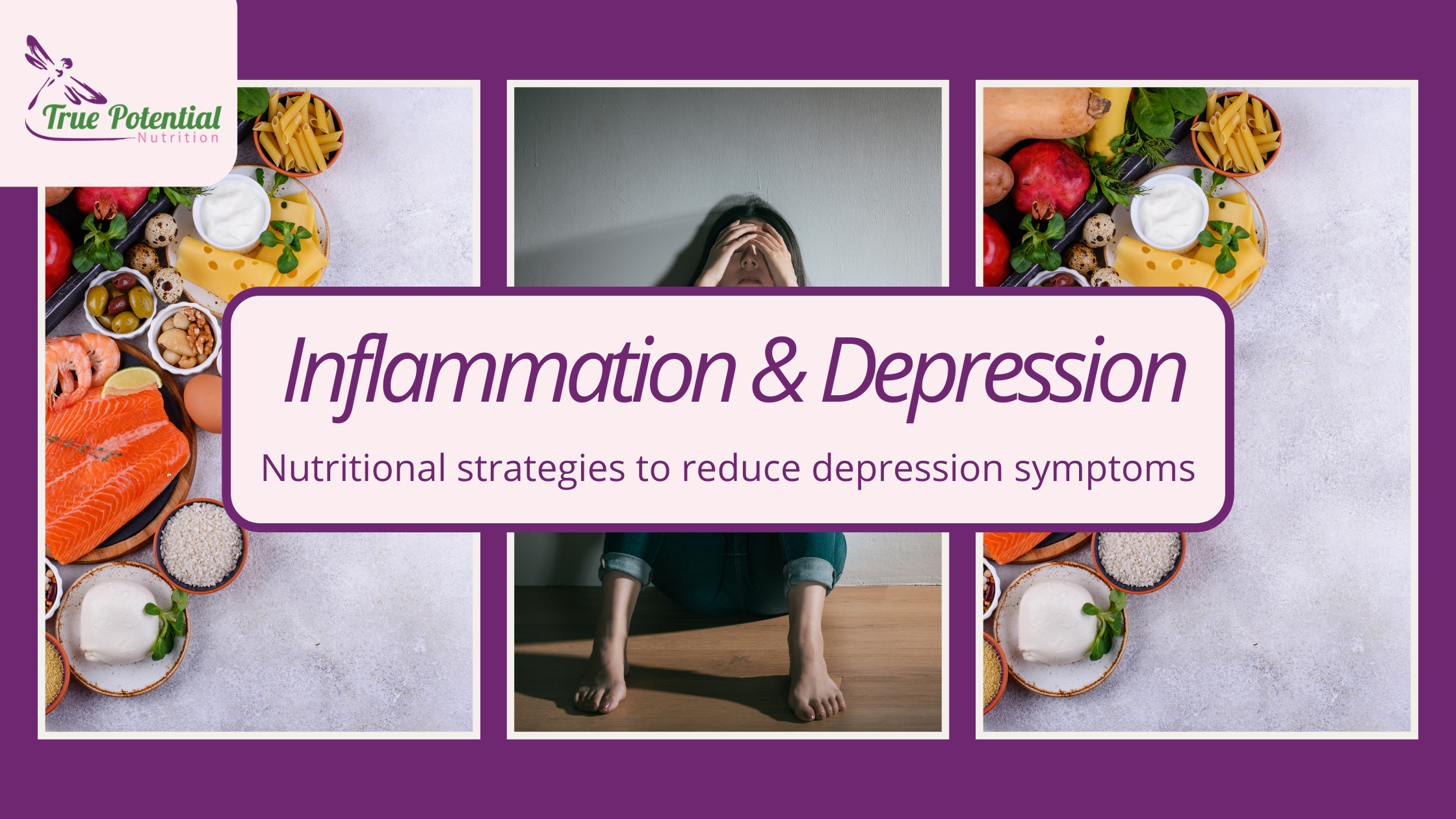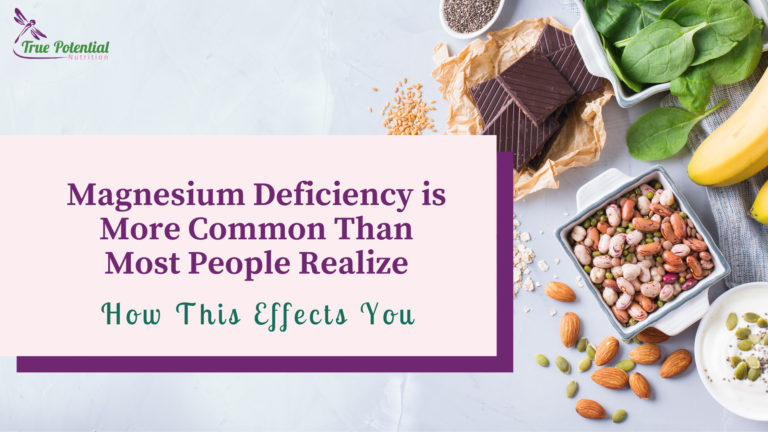By Danielle MacDowell M.S., CNS, LDN, M.Ed, BCBA, LABA

Main Takeaways
- It has been a long standing understanding that depression is a result of low serotonin production. However, we are learning that inflammation, amongst other factors may also contribute to depression.
- Inflammation allows the body to perform the essential functions needed for the body to recover, regenerate and heal.
- When our inflammatory processes become overburdened or inflammation lasts for too long, chronic illness and disease can result.
- Research shows that there is an association with some but not all inflammatory markers and depression.
- CRP and IL-6 are good measures of inflammation and both have been associated with depression.
- Research shows that inflammation can predict depression. And conversely, depression can predict inflammation. What is still not clear is which one comes first, depression or inflammation.
- A diet rich in inflammatory foods has been shown increase symptoms of depression while a diet rich in anti-inflammatory foods has been shown to decrease symptoms of depression.
- An inflammatory diet pattern tends to be rife in refined grains, sugars, processed meats and low in fruits, vegetables, whole grains, fish, nuts, and legumes.
- An anti-inflammatory diet is high in fruits, vegetables, whole grains, fish, nuts, and legumes and low in processed foods.
- An anti-inflammatory diet, such as the Mediterranean Diet, may help to improve symptoms of depression.
Table of Contents
Depression continues to be the #1 cause of disability in the world, impacting 10-20% of the population. [1]
It has been a long standing understanding that depression is a result of low serotonin production. However, researchers are learning that there may be more to the story. New theories regarding the cause of depression have come to light over the past decades, including:
- Mitochondrial dysfunction
- Metabolism irregularities
- Lifestyle factors
- Inflammation
Inflammation: The Underpinning of Most Diseases
Before we dive into depression and inflammation, let’s review what inflammation is…
In small doses, inflammation provides our body with a “system of information flow” that can be used to address acute illness and injury. [3] This process allows the body to perform the essential functions needed for the body to recover, regenerate and heal, including:
- Fight infection
- Clear pathogens
- Remove cellular debris
- Rid the body of damaged tissue
When viewed from this vantage point, inflammation doesn’t seem so bad, right? And this is true. “Normal” inflammation is not the problem. The problem begins when our inflammatory processes become overburdened or inflammation lasts for too long. When either of these situations occurs, it can cause systemic damage and result in disease, as seen in:
- Cardiovascular disease
- Allergies
- Cancer
- Type 2 diabetes
- Arthritis
- Depression
Depression and Inflammation
So, now that we know a bit more about inflammation, you may be wondering if you have too much inflammation in your body. Well, there are a couple ways to determine this.
We can do this through indirect measures and direct measures….Below I have listed a labs that can be done to determine if inflammation is present in your body.
Inflammatory Markers:
- C-reactive protein (CRP): CRP is an acute phase reactant, meaning, when there is inflammation in the body, this protein rises in the blood. This is the most common test for inflammation and the one health care providers are most likely going to order when it comes to inflammation.
- Interleukin-6 (IL-6) and tumor necrosis factor (TNF): These two inflammatory markers have been linked to depression.
- Homocysteine (HcY): Elevated homocysteine is often a result of genetics or B-vitamin deficiencies. However, elevated levels have been associated with inflammation.
- Ferritin: Ferritin is typically utilized to determine iron levels. However, similar to CRP, it is also an acute phase reactant. So, when there is inflammation, ferritin may become elevated.
Depression and Inflammation
Inflammatory Markers and Depression:
Both CRP and IL-6 are good measures of inflammation and both have been associated with depression. [2,4]
In a systematic review and meta-analysis conducted in 2020, [2] researchers analyzed 37 studies, which included 13,541 participants. Researchers assessed CRP levels in individuals with and without depression. They found that “over half of the participants with depression had mildly elevated CRP levels.”
In another meta-analysis, conducted in 2015, researchers casted a wider net. In addition to CRP, they also assessed for IL-6, TNF, and interleukin 1 Beta (IL-1B) in individuals with major depressive disorder (MDD). They found a positive association between CRP, IL-6, TNF and MDD. They did not find an association between IL-1B. In other words, there appears to be an association with some but not all inflammatory markers and depression.
Research shows that there is an association with some but not all inflammatory markers and depression.
Depression and Inflammation: A Bidirectional Relationship
Although inflammation and depresion seems like a new area of interest, it actually isn’t.
This research has been going on for decades….
In a 2020 meta-analysis, researchers examined research dating back to 1946 in effort to explore the association between depression and inflammation in children. Twenty-two articles, including 20,791 participants, were examined. After careful review of the data, researchers found “significant associations” between CRP and depression. They also found that depression is a “significant predictor of IL-6”. Lastly, they found that inflammation (as measured by CRP or IL-6) “predicts future depression”. [5]
Researchers noted that there is a “bidirectional” relationship between inflammation and depression, meaning inflammation may cause depression and depression may cause inflammation, making it sound a bit like a chicken and the egg discussion…
So, what does come first, inflammation or depression?
More research needs to be conducted to further investigate the topic. However, what does appear to be clear is that when inflammation is present, addressing the inflammation is critical. One way to do this is by adopting an anti-inflammatory diet.
Research shows that inflammation can predict depression. And conversely, depression can predict inflammation. What is still not clear is what comes first, depression or inflammation.
Depression, Inflammation & Diet
We know that diet can strongly influence a person’s health outcomes, for better or for worst.
We are beginning to learn that diet impacts more than one’s physical health, it can also impact mental wellbeing….
In a 2019 French study conducted on 26,730 participants, researchers concluded that an inflammatory diet can increase the risk of symptoms of depression. [6] Conversely, a study conducted in 2016 on 82,643 American participants, demonstrated that a diet rich in flavonoids (plant chemicals found in fruits and vegetables) can decrease the risk for depression. [6] So, in other words, a diet rich in inflammatory foods has been shown to increase symptoms of depression while a diet rich in anti-inflammatory foods has been shown to decrease symptoms of depression.
A diet rich in inflammatory foods may increase symptoms of depression while a diet rich in anti-inflammatory foods may decrease symptoms of depression.
After reading the above, you may be wondering what constitutes a pro-inflammatory diet and what is considered an anti-inflammatory diet?
Let’s dig into this further…
What is an Inflammatory Diet?
An inflammatory diet has 2 parts:
1.) The foods that people tend to eat a lot of
2.) The foods do not eat much of.
Both of these components are equally important when it comes to our health.
An inflammatory diet pattern tends to be rich in:
- Refined grains
- Sugars
- Processed meats
- Processed foods
An Inflammatory Diet is also low in:
- Fruits
- Vegetables
- Whole grains
- Fish
- Nuts
- Legumes
Inflammatory Cooking Methods
It is important to know that it is not only the foods that we are ingesting (or not ingesting) that contribute to our overall inflammatory load, it is also the way we prepare and process our foods.
Using high-heat cooking methods, such as frying and grilling, produce products known as advanced glycation end products (AGES). These advanced glycation end products also contribute to systemic inflammation.
So, using moderate-heat and choosing gentle cooking methods, such as steaming and boiling, can also reduce inflammation in the body.
An inflammatory diet pattern tends to be rife in refined grains, sugars, processed meats and low in fruits, vegetables, whole grains, fish, nuts, and legumes.
Inflammation and Cooking Methods
Inflammatory Cooking Methods
It is important to know that it is not only the foods that we are ingesting (or not ingesting) that contribute to our overall inflammatory load, it is also the way we prepare and process our foods.
Using high-heat cooking methods, such as frying and grilling, produce products known as advanced glycation end products (AGES). These advanced glycation end products also contribute to systemic inflammation.
So, using moderate-heat and choosing gentle cooking methods, such as steaming and boiling, can also reduce inflammation in the body.
Inflammation is not only brought on by the foods that we eat. Cooking methods can also increase the inflammation load within our body.
Anti-inflammatory Diet
As you can imagine, an anti-inflammatory is the opposite of an inflammatory diet. An anti-inflammatory diet is high in fruits, vegetables, whole grains, fish, nuts, and legumes and low in processed foods.
In spite of the way it may appear, the anti-inflammatory diet is not a singular diet. Rather, it is a pattern, or a way of eating that reduces inflammation in the body.
Anti-inflammatory (AI) diets are packaged differently but all strive for the same goal: a reduction in inflammation. Some common anti-inflammatory diets are:
- Mediterranean diet
- Paleo diet
- Hypoallergenic diet
- Elimination diet
- Oligoantigenic diet
- Autoimmune diet
Commonalities amongst anti-inflammatory diets include:
A high intake of:
- Polyunsaturated fats (PUFAs)
- Polyphenols
- Fruits
- Vegetables
- Seeds
- Nuts
Limited consumption of:
- Refined grains
- Sugars
- Processed meats
Not only is the Mediterranean diet positively correlated with better mental health outcomes, it plays a protective role against heart disease, DNA degradation, and cognitive decline.
Final Thoughts and Main Takeaways
Depression continues to be the #1 cause of disability in the world, impacting 10-20% of the population. [1] For a long time, we have understood that depression is a result of low serotonin production. However, researchers are learning that there may be more to the story; inflammation appears to be a key player in depression.
Research shows that inflammation may predict depression. And conversely, depression may predict inflammation. What is still not clear is what comes first, depression or inflammation. However, what is becoming more evident is that modifiable factors, such as diet, can play a role in depression, presumably by their impact on inflammation. For this reason, an anti-inflammatory diet can be a powerful tool in reducing depressive symptoms.
1:1 Consultations and Functional Testing with True Potential Nutrition
I am a functional nutritionist, specializing in gut health, hormonal health, mental health, and neurodiversity. If you are looking for personalized nutrition recommendations or functional testing, visit this link to set up a free discovery call to find out how I can help you reach your health and wellness goals.
- Reddy MS. Depression: the disorder and the burden. Indian J Psychol Med. 2010;32(1):1-2. doi:10.4103/0253-7176.70510
- Osimo EF, Pillinger T, Rodriguez IM, Khandaker GM, Pariante CM, Howes OD. Inflammatory markers in depression: A meta-analysis of mean differences and variability in 5,166 patients and 5,083 controls. Brain Behav Immun. 2020;87:901-909. doi:10.1016/j.bbi.2020.02.010
- Pizzorno J, Katzinger J. Clinical Pathophysiology: A Functional Perspective.
Coquitlam, British Columbia: Mind Publishing; 2012. - Haapakoski R, Mathieu J, Ebmeier KP, Alenius H, Kivimäki M. Cumulative meta-analysis of interleukins 6 and 1β, tumour necrosis factor α and C-reactive protein in patients with major depressive disorder. Brain Behav Immun. 2015;49:206-215. doi:10.1016/j.bbi.2015.06.001
- Colasanto M, Madigan S, Korczak DJ. Depression and inflammation among children and adolescents: A meta-analysis. J Affect Disord. 2020;277:940-948. doi:10.1016/j.jad.2020.09.025
- Ljungberg T, Bondza E, Lethin C. Evidence of the Importance of Dietary Habits Regarding Depressive Symptoms and Depression. Int J Environ Res Public Health. 2020;17(5):1616. Published 2020 Mar 2. doi:10.3390/ijerph17051616



